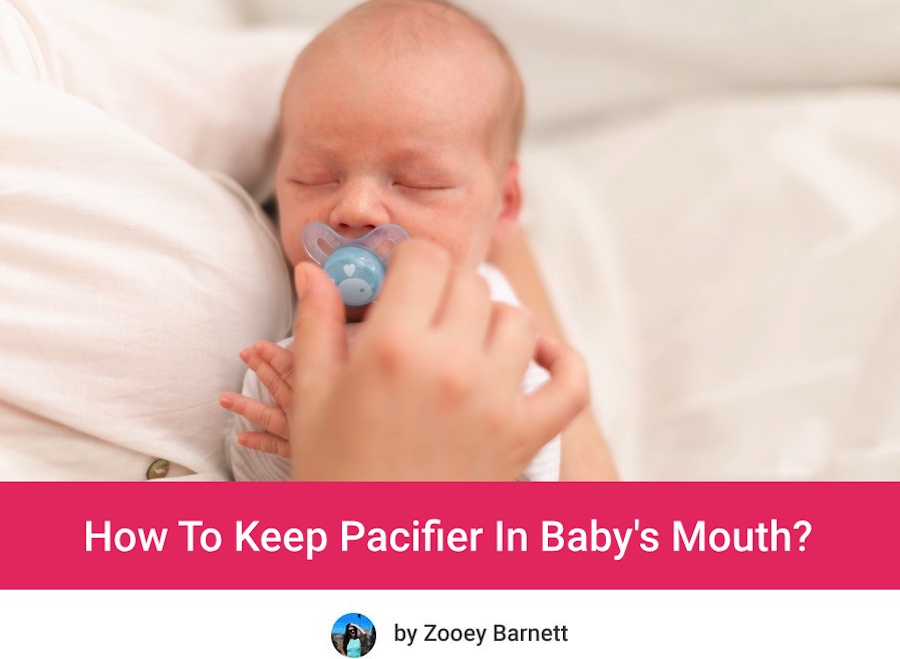
Did you know that the American Academy of Pediatrics has found an interesting link between pacifier use and Sudden Infant Death Syndrome? Research shows that using a pacifier for your baby may actually reduce their risk of SIDS.
Baby pacifiers can also help babies increase their sucking strength and be a tool for learning to self soothe. If you were unsure about introducing a binky before, know that using one to comfort a fussy baby is more thank okay – it could even have additional benefits.
That being said, if your baby already uses a pacifier, you may be annoyed with how to keep a pacifier in baby’s mouth. Does it seem to always be dropping from your newborn’s mouth when they sleep? If your baby wakes as soon as the pacifier drops, you may be feeling frustrated (and overtired).
If you’re looking for ways to keep the pacifier in your child’s mouth, let me tell you straight away: there is no safe way to prevent a pacifier falling out. But, there are some tricks to keep the pacifier, or make it easier to deal with a dropped pacifier so that parents can get a little more sleep.
This article is not a substitute for medical advice or consultation.
Does My Baby Need Pacifier During Nighttime Sleep?
Using a pacifier is purely about preference. Some babies never use a pacifier, and that’s okay. There are lots of useful alternatives to pacifiers (both for young infants as well as toddlers).
But if you decide you want to use a pacifier, here are some benefits:
- Researchers saw a link between reduced risk of SIDS and pacifier use1, so feel confident using pacifiers (but no pacifier cords or attached ‘lovies’ in the crib) for sleep.
- Can help premature infants or newborns increase low muscle tone in their jaw. Basically, it can build up their sucking strength, which is important for successful breastfeeding. Even some full-term babies struggle with poor suction and ‘practice-sucking’ with a pacifier can help a baby develop the right muscles.
- A pacifier helps soothe babies who may enjoy the sensation of sucking, despite not being hungry. Non-nutritive sucking is normal, and many babies do it. This is one reason pacifiers can be beneficial because they reduce risk of overeating in a breastfed baby2.
- Pacifiers can also help during flights, because the movement of the jaw helps alleviate pressure in the ears and reduces pain.
Alternatively, excessive pacifier use sometimes is associated with ear infections, so talk to your doctor if you think there is a link with ear infections and pacifier use with your baby3.
Another worry moms might have about pacifiers and newborns is nipple confusion, especially if they are struggling with breastfeeding already. Pacifiers aren’t often a culprit with this, but if you have concerns, talk to your doctor or a lactation consultant about how to introduce a pacifier, but avoid nipple confusion during breastfeeding4.
Some babies prefer to fall asleep while sucking on a pacifier. This isn’t necessarily a problem unless they wake up if it falls out. But let’s be realistic here: they almost always wake up when it falls out.
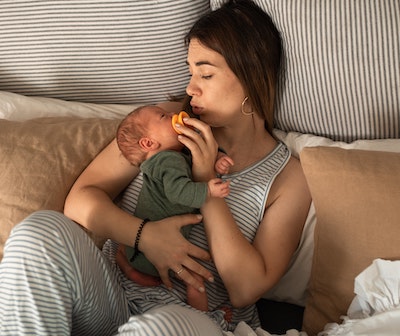
Why Can’t My Baby Keep A Pacifier In His Mouth While Sleeping?
Here are some of the main reasons why your baby can’t keep pacifier in their mouth.
1. Baby’s Mouth Relaxes During Sleep
The main reason a sleeping baby cannot keep a binky in the mouth is because the muscles in the of the jaw relax during deep sleep – just like what happens with adults. Your mouth probably occasionally hangs open during sleep, too.
Babies jaws won’t stay clamped as they sleep soundly, so the pacifier falls out.
There’s actually nothing you can safely do to prevent this, but read on, I’ll give you a tip to help it from affecting baby’s sleep.
2. Is Baby Using The Best Pacifier For Their Age?
Pacifiers come in different sizes based on age. Pacifiers for older children are usually bigger, so young infants may have a difficult time keeping the pacifier in their mouth because it is just too big.
Check the age range for the pacifier, this could be the reason it is hard to keep the pacifier in baby’s mouth.
3. Baby Prefers A Different Pacifier Nipple
Despite the many different pacifiers out there, there are really only two basic types of nipples at the end of those pacifiers: round or orthodontic nipples.
Orthodontic nipples are designed by baby experts to reduce risk of dental or jaw issues later, while round nipples feel more like a mother’s body5.
Your baby might actually prefer one style over another. See if one type of pacifier stays in baby’s mouth more easily during sleep.
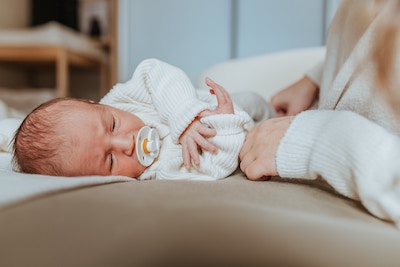
How Do I Keep My Baby’s Pacifier From Falling Out Of His Mouth?
Here’s how you can prevent the pacifier from falling out of baby’s mouth:
1. Try Different Nipple Shapes
If you think your infant might prefer an orthodontic nipple over a round one, then try it out. It might be the key to getting your baby to keep the pacifier in his mouth at night.
2. Try Different Sizes
Remember to check the age range for all baby pacifiers. While it might make sense that a baby drops a pacifier from their mouth because it is too big, the same might be true if the pacifier is too small.
Don’t give your 18 month old pacifiers made for a 3 month old baby, for example.
3. Switch To A Silicone Pacifier
The material used in pacifiers matters. While you may like the look and feel of natural rubber, this material is much firmer, and might be difficult for your baby to suck on.
Silicone pacifier nipples are softer and more malleable, making them a good choice for younger babies who may need something softer to suck on6.
4. Use A Glow-In-The-Dark Pacifier
Okay, so this tip won’t actually ensure the pacifier stays in baby’s mouth, but it will help you find it in the dark much easier!
Glow in the dark pacifiers mean you don’t need to turn on a light. Parents can easily spot baby’s dropped pacifier under the crib or at the end of their crib mattress, even in the dark.
Being quick to locate and replace is second-best to preventing a baby dropping a pacifier to begin with.
5. Teach To Sleep Without A Pacifier
Finally, baby sleep experts agree; the best way to get a baby to stop waking up from a pacifier falling out of their mouth is to help them learn how to fall asleep independently, without dependence on the pacifier to self-soothe7.
I call this the ‘pop-when-drowsy’ method. Pay attention to baby’s sleeping cues, and when you see them starting to drift off (but not actually asleep yet) pop the paci.
The first few times, they may cry (that’s normal), but since they are already tired, your child should begin to learn to fall asleep without the pacifier. Once they’ve mastered this, they shouldn’t wake up if it falls from their mouth during sleep.
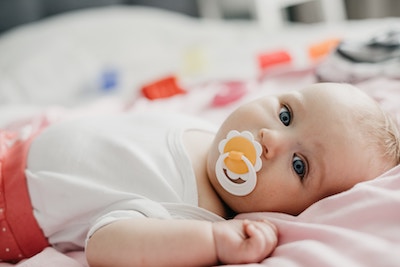
How Do I Stop My Baby From Throwing The Pacifier Out Of The Crib?
So, what if, for your little one, it’s not about the pacifier dropping, but more about your child throwing it away? Newborns don’t have the motor skills to do this, so it’s generally older babies who are curious about cause-and-effect that like to do this.
Learning Opportunity
If your child is crying because they can see their binky, but cannot reach it, do not rush to return it for them.
Are they at an age where they also drop their spoon during feeding time or toss food on the ground? while it might be annoying for parents, this is important learning for babies.
Think of it as an experiment with cause-and-effect, if you rush to return the dropped item (be it a spoon or a paci) they don’t learn that gravity will keep the item they tossed or spit on the ground.
You can return it, sure, but rushing to do so doesn’t allow for the learning opportunity. Take a moment to talk to them about it and help them to see that it stays on the ground. Bring them out of the crib or high chair and allow them to pick up the dropped item themselves.
Baby Spits The Pacifier Out – What NOT To Do
No matter how frustrating it can be to keep the pacifier in your baby’s mouth, never put them to sleep with:
- Pacifier attached to stuffed animals
- Paci cord or other ribbon or string attached to their clothes, or near baby’s neck
- Any item used to ‘prop’ the pacifier against their mouth
Despite the clever tips and tricks, there is actually no safe way to prevent a pacifier from falling out in their sleep. It is simply a result of muscles relaxing during sleep, and any means of propping or attaching a pacifier in a baby’s mouth is a major suffocation or choking hazard – don’t do it!
1. Don’t Attach Pacifiers To Stuffed Animals Or Lovey’s
The cute stuffed animals with pacifiers attached at the end may be a great comfort for your baby, but these should only be used with supervision, or while your infant is in a car seat or stroller.
Do not use these in your baby’s crib, either for bedtime or naptime. They pose a suffocation risk.
2. Don’t Use A Pacifier Cord In The Crib
While there are cute clips and ways to attached a pacifier to your baby’s clothes these should be removed before baby lies down to sleep.
Anything with a cord or string could be a strangulation risk when they are in bed. It’s better to keep baby’s neck safe and deal with the pacifier when it falls out, instead.
3. No Items In The Crib/Near Baby’s Face
Don’t prop anything against the pacifier or wrap the swaddle around baby’s mouth to keep the pacifier in place.
If you baby regularly wakes because of a dropped pacifier, consider the ‘pop-when-drowsy’ approach, mentioned below. it teaches your baby how to fall asleep (and stay asleep) without a pacifier.
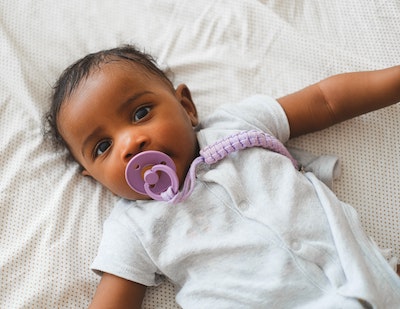
Pacifier Falling Out Of Mouth – FAQ
Using pacifiers is really up to what the baby likes, and the parents preference.
If you do decide to use one during the early years, make sure you get the right pacifier; consider the age of your baby and the nipple’s shape, too.
How Do You Get A Baby To Suck On A Pacifier?
The best way to encourage a baby to suck on a paci is to take it away8!
While it might sound counter-intuitive, this ‘reverse psychology’ teaches a baby to pull back, and suck harder, thus teaching them how to properly suck.
If your baby likes pacifiers or your lactation consultant has suggested you use one, you could try this approach. But if your child doesn’t seem interested in using one, you may skip binkies all together.
Should I Take The Pacifier Out After Baby Falls Sleep?
The best approach is to take a pacifier out of a baby’s mouth just before they fall asleep.
This is the ‘pop-when-drowsy’ trick to teach babies to sleep without a paci (and will save you lost sleep, later on).
But, if you feel you need to remove a baby’s pacifier after he or she has fallen asleep, it is okay to do so. Just know, you do risk waking them up.
Why Does My Baby Wake Up When The Pacifier Falls Out?
Your baby may wake up when the paci falls out because they were ‘sucking in their sleep’ (non-nutritive sucking).
They can feel the difference when they had something in their mouth, and now they do not.
Can You Give The Pacifier Back To Your Baby During The Night?
It is fine to give your baby back the pacifier if he or she wakes up during the night. Just make sure that it’s only comfort that you baby wants.
Newborns need to eat as frequently as every three hours, so consider if your baby is hungry or has a soiled diaper before popping the binky back in.
The purpose of this article is informative. It’s not a substitute for professional medical advice or medical care. Remember: safety first! Consult your doctor/pediatrician in case of any doubts. The author of this article does not accept any responsibility for any liability, loss or risk, personal or otherwise, incurred as a consequence, directly or indirectly, from any information or advice contained here.
Resources:
https://www.healthychildren.org/
https://www.ncbi.nlm.nih.gov/
https://takingcarababies.com/
https://www.babycubby.com/
https://www.happiestbaby.com/

